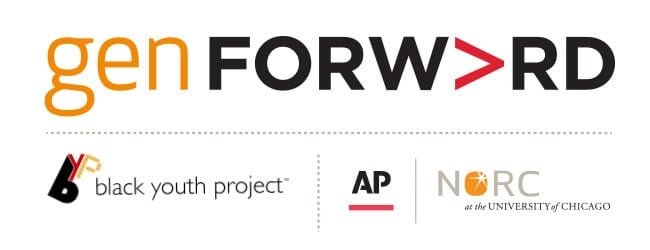Issues surrounding race and ethnicity are driving factors in the voting calculus of many young people of color and a majority of all young people believe the U.S. is a long way from achieving racial equality, according to a first-of-its-kind GenForward survey from the Black Youth Project at the University of Chicago with The Associated Press-NORC Center for Public Affairs Research.
The study finds that while support is higher for Hillary Clinton than it is for Donald Trump among people ages 18-30, nearly 4 in 10 of them are not satisfied with either candidate and are planning to sit out the election or vote for a third-party candidate.
“Any talk of a monolithic youth vote is uninformed. There are vast differences in which candidates young adults support, as well as who they plan to vote for in November, based on race and ethnicity,” said Cathy Cohen, a professor of political science and founder of the Black Youth Project at the University of Chicago. “Our new monthly survey will pay special attention to how race and ethnicity shape how young adults experience and think about the world.”
Some of the key findings among young adults ages 18 to 30 include:
- Majorities of African Americans and Asian Americans support Clinton while whites are evenly split between Clinton and Trump. More would vote for Hillary Clinton (38 percent) than Donald Trump (17 percent).
- About 3 in 10 whites view Trump favorably compared with 1 in 10 African Americans, Asian Americans, and Latinos. Nineteen percent overall have a favorable opinion of Donald Trump and 21 percent say he is qualified to be president.
- Majorities of African Americans (64 percent) and Asian Americans (55 percent) have a favorable view of Hillary Clinton compared to only 26 percent of whites. Thirty-nine percent of all young adults have a favorable opinion of her and about half say she is qualified to be president (55 percent).
- Neither Clinton nor Trump is viewed as honest or trustworthy.
- For young adults, the presidential race is not all about the economy. African Americans rate racism and police brutality as important as the economy when deciding who to vote for. Among Hispanics, immigration and racism rank as high as economic issues in determining their vote choice. For whites and Asian Americans, race-related issues are not top priorities.
- A majority of all racial groups say racism remains a major problem in our society, although there are significant differences between African Americans and whites on the issues. Eighty percent of African Americans say racism is a major problem in society compared with 54 percent of whites.
- About 3 in 4 say money and wealth should be more evenly distributed. Majorities support raising taxes on millionaires (78 percent), free tuition at public colleges (76 percent), and raising the minimum wage (69 percent). Those of color are more likely than whites to support free tuition and raising the minimum wage.
- There is a split between prioritizing the rights of gun ownership or gun control. Forty-eight percent favor protecting gun ownership, while 52 percent favor gun control. Asian Americans are the only racial group in which there is a clear consensus (83 percent favor gun control).
- Most young adults believe America is in decline. Many say America is falling behind (52 percent) or failing (24 percent) while few say it is greater than it has ever been (5 percent) or equally as good as in the past (14 percent).
- Across racial and ethnic groups, there are divided perspectives over whether equal opportunity exists in America. A majority (54 percent) say just a few people at the top have a chance to get ahead in today’s economy while 46 percent think anyone can get ahead.
- Many young people, but especially young whites, have concerns about the two-party political system. Fifty-four percent say the country’s two-party system is seriously broken but still believe it could be fixed, while 36 percent say it is seriously broken (only 9 percent think it works well). Whites are the most likely to say the system is seriously broken (41 percent), compared to young African Americans (25 percent), Hispanics (29 percent), and Asian Americans (35 percent).
“Whether you look at electoral politics or issues, the views and perspectives of young people are just as diverse as the generation itself,” said Trevor Tompson, director of The AP-NORC Center. “Issues of race and ethnicity—from immigration to police brutality—are driving votes. Many young adults, especially those of color, continue to see racism as a major problem for this country, and they oppose in great numbers policies targeted at certain racial and ethnic groups.”
About the Survey
Data come from GenForward, a survey of the Black Youth Project at the University of Chicago with the AP-NORC Center, with a nationally representative sample of 1,965 adults 18-30 years old. Interviews were completed online and using landlines and cellphones from June 14 to 27, 2016. Results have a margin of sampling error of +/- 3.8 percentage points. More information about the survey and reports can be found at www.GenForwardSurvey.com.
The proper description of the survey’s authorship is as follows: GenForward is a survey of the Black Youth Project at the University of Chicago with The Associated Press-NORC Center for Public Affairs Research.


